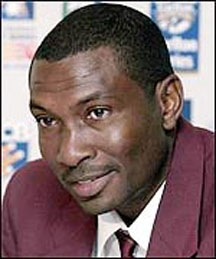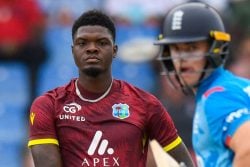By Neil Barry Jr.,
The National Cricket Stakeholders Group (NCSG) on Saturday stated that they believe that having the Upper Demerara Cricket Association (UDCA) become the fifth arm of the Demerara Cricket Board (DCB) could bring an end to the struggle for control of the DCB and effectively bring an end to the ongoing saga enveloping cricket administration in Guyana.
The group made that disclosure on Saturday at a press briefing held at the Manila Hotel, Perer Street, Kitty.
Present at the press briefing were Claude Raphael, Roger Harper, Bissoondyal Singh, Angela Haniff, Floyd Benjamin, Ravendranauth Saywack, Raymond Barton, Clayton Van Hersel, Marvin Burns, Malcolm Peters and Leslie Solomon.

The NCSG is made up of representatives from the Berbice Cricket Board (BCB), Georgetown Cricket Association (GCA), East Coast Cricket Board (ECB) and the Upper Demerara Cricket Association UDCA).
Ronald Williams, who chaired the proceedings said that the NCSG was keen on introducing the UDCA as the fifth component of the DCB adding that Upper Demerara was a huge community with over 40,000 persons residing there.
“The UDCA has a constitution of their own since 2000 and they have an executive body in place, with former West Indies cricketer Basil Butcher being the signature to the initial constitution while they have produced such players as Dr. Vincent Adams, Orin Gordon, Anthony Rigby and Mark Grenville among others.
Upper Demerara’s Burns, said that the area has been playing competitive cricket and that it boasts 17 registered clubs with as many as eight matches being played simultaneously on some occasions. He opined that three grounds have been the backbone venues for competitions, those being located at Bayrock, Christianburg, and Mackenzie.
Burns added that the spirit of cricket was still well and truly alive in the region. However, he said the acquisition of funds for sponsorship and developmental programmes have been difficult since they have been denied registration under the DCB umbrella.
He expressed dissatisfaction with efforts being made to have the association merged with the East Bank Cricket Assocation, as location logistics among other reasons make it impractical and unfair, he argued.
Burns stressed the need for urgent attention to be placed on the situation so that the region may gain upward mobility. He added that players are sometimes required to travel in excess of 25 miles to play regular club matches at their own cost because of the region’s inability to acquire funding and subventions from the GCB while talented players often go unnoticed because the lack of integration with other associations results in the UDCA being excluded from inter association competitions.
Williams, in response to the plea for Upper Demerara to be included as the fifth arm of the DCB said:“The grave injustice is that body is not attached to any cricket body. They are like orphans as they are not attached to the GCB, DCB or East Bank, which means we have a large community of 40 000 people playing cricket contributing to the development of the sport in Guyana, but totally unattached and that is a blatant injustice, one we are seeking to rectify by having the UDCA incorporated as the fifth arm of the DCB.”
Williams said that a large percentage of Guyana’s cricketers come from Berbice, Georgetown and the East Coast of Demerara.
“Look also at the clubs that are available in Guyana; the first division clubs and you would see 80 to 90% of those clubs featuring pitches, pavilions, dressing rooms and sight screens coming from Berbice, East Coast and Georgetown, so when we boast of having 80% of the cricket strength in Guyana, that is not an idle boast”.
“If you have such a strong cricket structure, why should you be excluded from cricket administration in a cricket-loving country?” asked Williams.
The NCSG believes that should elections be held for the Demerara Cricket Board again, the support of Upper Demerara, along with the Georgetown Cricket Association and the East Coast Cricket Board will give them the necessary votes to secure control of the board.
In elections held on July 10, 2011, of the 11 of the 27 delegates that voted at the GCB’s elections, nine were from the Essequibo Cricket Board and two from the BCB.




